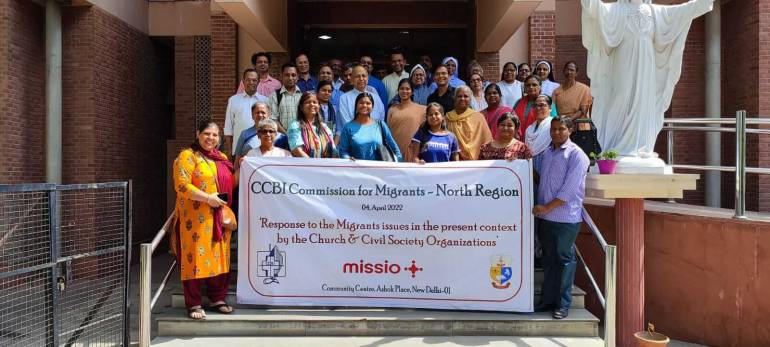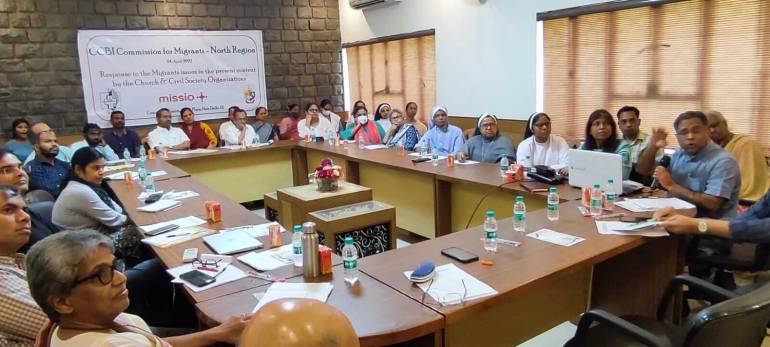Church leaders recommit to journey with migrants in North India

The Conference of Catholic Bishops of India (CCBI) Commission for Migrants North Region organized a one-day seminar in Delhi on April 4.
It was held on the “Response to migrants’ issues in the present context by the Church and civil society organizations in consonance with Synodality.”
North Region consists of the Diocese of Jalandhar, Jammu and Kashmir, Shimla Chandigarh, and Delhi.
Archbishop Anil J T Couto of Delhi and chairman, Commission for Migrants North Region delivered the inaugural message, highlighting the importance of pastoral and human responsibility towards the migrants.
Echoing ideas from Pope Francis’ document ‘Fratelli Tutti’ (All Brothers), Couto said, “Nationalist and populist regimes, crouching down behind defensive walls, seek to keep migrants out. Too often, we witness a xenophobic mentality whereby migrants are not seen as entitled like others to participate in the life of society. It is forgotten that they possess the same intrinsic dignity as any person.”
This mentality, Pope Francis stresses, is simply not compatible with Christianity, “since it sets certain political preferences above deep convictions of our faith, the inalienable dignity of each human person, the prelate explained.
Couto said, “The church cannot be a looker. The arrival of COVID-19 and its effects brought our consciousness and the awareness has increased.”
The North Region will work in a better way for the migrants both interstate as well as international.
“We have a huge responsibility as we are in the synodal process to bring equilibrium to our dioceses, organizations, and institutions,” Couto said.
The National Capital Region, India, has the second-largest migrant population. Thus, every parish and institution needs to understand the veracity of the issues the migrants face and work hand in hand to help them. In the end without them, Delhi would not have been what it is today.
Also, the situation of migrants in India is one such which speaks the tales of the invisible workforce who have become visible with multiple challenges to survive at the time of the pandemic.
“The subsequent lockdowns during the COVID wave have revealed that the migrant workforce in India is already highly vulnerable and we as people involved in different ways with different groups could plan together to mitigate the cares and anxieties of our migrant brothers and sisters,” Couto said.
Taking a cue from ‘Rerum Novarum’ (Rights and Duties of Capital and Labor, an encyclical issued by Pope Leo XIII, May 15, 1891), keynote speaker Dr. Stanislaus Alla emphasized the social teachings of the Church and family wages which the migrants need.
He shared from his interview with the domestic workers.
He said the hard truth is that migrant domestic workers face the issues like underpayment and harassment. The worst of it is that during the long hours of work they have no access to restrooms.
“We must personally reach out to the peripheries, to those who have left the church, those who rarely or never practice their faith, those who experience poverty or marginalization, refugees, the excluded, and the voiceless,” Alla said.
The seminar focused on the health issues of migrants and the non-affordability and non-availability of medical assistance.
Dr. Daisy Panna, an Epidemiologist with the Federal Ministry of Health explained in detail all the schemes and policies for women and children.
She is the Secretary of the Diocesan Pastoral council and raised her concern for the poor migrants who are unable to access the benefits as they do not possess the “Aadhaar (English: foundation or base) card, a federal identification number to avail of government’s welfare schemes.
The Delhi Region is called upon to assist these migrants with the necessary documents to obtain Aadhaar Cards.
Nirmal Gorana, an expert in rescuing bonded laborers gave shocking information about hundreds of bonded laborers in the cities within four walls of different houses, brick kilns, and factories.
He has been collaborating with this commission from the very beginning. He said the church as an organized body could help the migrants from falling into the hands of illegal agents and being trapped.
Presentation Sister Elsa Muttathu, the new national secretary of the Conference of Religious India raised the points of setting up of helpline for migrants, educating the migrant children, upskilling and organizing these unorganized people.
Ms. Lee Macqueen, a socialist inclusion facilitator, and Disaster Risk Reduction and Climate Change Adaptation Practitioner, identified the various issues of the Scheduled Castes and Scheduled Tribes and Dalits (untouchables, the lowest caste within Hindu society).
She said the minimum wage in many places has become a matter of convenience.
She challenged the group by asking whether the church also treats the wage as a matter of convenience or concern.
The participants consisted of priests, nuns, and lay faithful who discussed the various issues of the migrants in India, the world’s second most populated country after China.

The inputs from the exponents helped them to take concrete action plans for the migrants in their respective areas.
Father Jaison Vadassery, the executive secretary of the Commission for Migrants, CCBI, expressed his concern over the inadequacies, joblessness and human trafficking migrants face.
He emphasized the responsibility of the Church in caring for the migrants after the example of Pope Francis, who always speaks from their perspective.
“The inclusive church is the one that our migrants look for,” said Father Badassery.
He welcomed all the diocesan counterparts to look into the synodal process seriously and embrace the migrants with a listening year and a welcoming heart.
The Delhi Region has decided to help the migrants for their economic justice with a plan to create awareness of the existing policies of the government by advocating with them.
Sensitization of the issues of migrants in the seminaries will be done with the cooperation and collaboration of the major seminaries in India.
Each diocese has commissioned different groups that must converge and coordinate to assist the migrants.
The crucial concern of education of the migrant children and youth will be taken care of by the concerning parish. Parishes function as a primary contact point among migrant communities' needs to converge at the diocesan level than having isolated interventions.
Other initiatives would include programs for school children and youth going through psychological stresses during COVID-19, male efforts to begin from non-formal education and skill development but the transition toward formula education.
Enough attention will be given to the registration of migrant workers at the source parish level and help build a database for policy interventions
All parishes would include migrant workers in the meetings to promote their participation in decision-making.
The participants of the seminar were leaders of various organizations, clergy, and nuns representing the dioceses of Shimla Chandigarh, Jammu, Kashmir, Agra, Meerut, and Delhi.
Radio Veritas Asia (RVA), a media platform of the Catholic Church, aims to share Christ. RVA started in 1969 as a continental Catholic radio station to serve Asian countries in their respective local language, thus earning the tag “the Voice of Asian Christianity.” Responding to the emerging context, RVA embraced media platforms to connect with the global Asian audience via its 21 language websites and various social media platforms.













